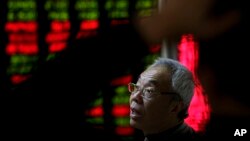Stock markets in China finished largely even following a volatile round of trading Tuesday, as the government moved in to prop up share prices and stabilize the market, analysts say.
The turbulent trading came just a day after indexes plunged 7 percent in a selloff Monday that spread to markets across the globe.
Other markets in Asia also struggled on Tuesday to regain their footing and ended down, but only slightly.
Analysts say the market jitters are likely to continue, but are not unexpected as uncertainty over the outlook for China’s economy remains.
Skepticism
China’s growth has been slowing and there is skepticism in the market over the government's forecast that growth can continue at a pace of 6.5 to 7 percent over the next five years, said Liao Qun, chief economist at China CITIC Bank.
“If the government can send the market a signal that that goal can be reached – because 6.5 to 7 percent is still a rapid pace of growth – and give the market a shot of confidence that this will not be a problem, then that will be a sign that the economy is stabilizing,” Liao said. “And it would help stabilize the currency and the market.”
Next week, Chinese authorities are scheduled to release economic growth figures for 2015 and that is something investors in China are watching closely. It has them on edge, he said, especially whether or not there were signs the economy was stabilizing in the fourth quarter or in December.
“If the figures are not good, the market will continue to slide and fears will persist,” Liao said.
On Tuesday, markets in Shanghai and Shenzhen opened sharply lower and were down again about 2 percent in late trading before rallying in the final hour to finish within 0.3 percent of Monday's close.
The massive losses on Monday prompted officials to initiate new “circuit breaker” measures that require market trading to halt entirely when the index drops as much as 7 percent in one session.
Opportunities possible
While some analysts argue the new measures are unnecessary and feed into fears about the broader state of the economy, some say the adjustments are part of a broader change for the market that could lead to investment opportunities down the road.
In an article on the Shanghai Securities News website, Guotai Junan Securities analyst Ren Zeping urged investors to not be so emotionally attached to the rise and fall of the market.
“Don’t just love bull markets and hate bear markets,” he wrote. “Use bull markets to earn money and bear markets to recharge your batteries.”
Monday’s global selloff was largely sparked by another disappointing report on Chinese manufacturing. Investors saw that as evidence that China’s economic growth is slowing down.
China is the world’s second-largest economy and a key market for many other nations, and concerns continued to impede other markets in Asia on Tuesday.
Japan's Nikkei, which fell 3 percent Monday, rallied to a small gain Tuesday before dipping into negative territory to close down 0.42 percent.
In Hong Kong, the Hang Seng saw its early gains erased in afternoon trading with the index falling about 0.5 percent near market close.
Joyce Huang contributed to this report.




